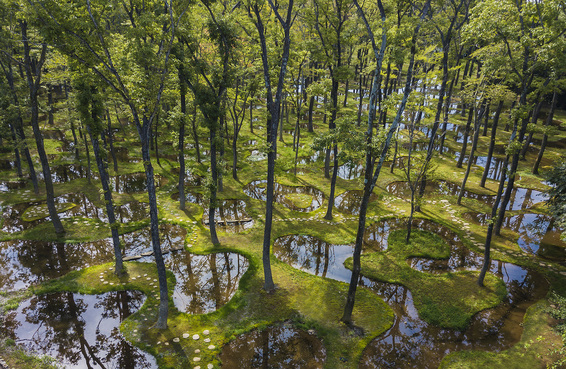
R
E
V N
E
X
T
On October 22, at a ceremony at Aalborg’s Utzon Center, the Copenhagen-based Henrik Frode Obel Foundation conferred the inaugural Obel Award to Junya Ishigami+Associates’ botanical project Art Biotop Water Garden. The annual international award was launched by the Foundation to recognize “recent and outstanding architectural contributions to human development.” Obel is the most expensive architecture award in Europe, comprising a cash prize of EUR 100,000 (USD 111,240) and a unique work by artist Tomás Saraceno.
The Water Garden, with a forest of overgrown moss and trees situated between ponds, is an outdoor extension of artist residence Art Biotop Nasu in Tochigi, Japan, and officially opened on June 3, 2018. Originally a meadow, the area features re-planted trees that had been salvaged from an adjacent construction site, while water is drawn from sluice gates to interlink with an existing irrigation system.
Japanese architect Junya Ishigami, who founded his firm in 2004, is known for his unconventional design practices incorporating natural elements. Ishigami’s four-meter-high model of a building with carbon-fiber pillars, Architecture as air: study for château la coste (2010), won the Golden Lion award for best project at the 12th Venice Biennale of Architecture. Other major projects include the Serpentine Pavilion in London (2019), House of Peace in Copenhagen (2014), a garden of the Moscow Polytechnic Museum (2011), and the Kanagawa Institute of Technology (2008).
The jury for the first Obel Award, themed “Welfare Through Architecture,” was chaired by architect Martha Schwartz, and included Kjetil Trædal Thorsen, co-founder of Oslo-headquartered firm Snøhetta; Louis Becker, design principal and partner at Henning Larsen, Copenhagen; and academic Wilhelm Vossenkuhl. In their joint statement, the jurors praised Ishigami for inviting “professionals within the fields of architecture and visitors alike to foster a greater appreciation for the environment and to understand our relationship to it, but also to act with imagination, bravery, and respect. The project demonstrates how we can interact with and make our imprint on nature without destroying it.”
Projects eligible for the Obel Award include manifestos, masterplans, exhibitions, and completed buildings and landscape work from the last five years that “offer seminal solutions to urgent problems” in accordance with the edition’s specific theme. Candidates are nominated by independent international specialists within the field. The award is supported by the posthumous endowment of the late Danish businessman Henrik Frode Obel.
Lauren Long is ArtAsiaPacific’s news and web editor.
To read more of ArtAsiaPacific’s articles, visit our Digital Library.













